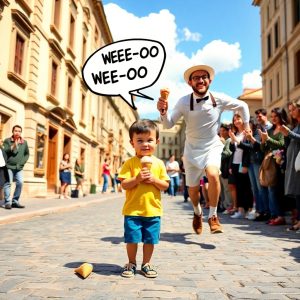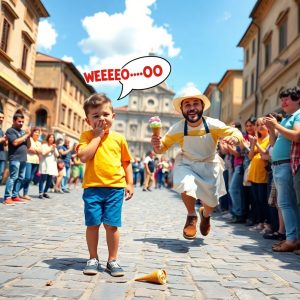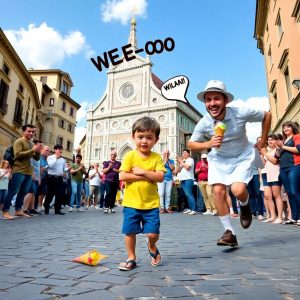The heat in Florence that afternoon had a sense of theater about it, like the city had lit its own stage lights and was waiting for the actors to remember their lines. The Duomo’s dome glowed like a ripe apricot, street musicians tuned their guitars, and somewhere a scooter sneezed to life and wove off like a restless bee. I had been walking for hours, happily lost, when I found the gelateria.

It wasn’t much to look at—just a narrow shop squeezed between a leather goods store and a postcard rack. But the display case was a painted choir: pistachio as green as fresh moss, raspberry the color of summer arguments, lemon glowing like bottled sun. A hand-lettered sign by the register read, in English and Italian, “Do not lick the glass (we know it’s tempting).” The owner—a man somewhere between thirty and timeless—had dark curls, a heroic mustache, and a white apron that had achieved a kind of permanent gelato polka-dot chic. His name tag simply said: **NONNO**.
“Nonno?” I asked, amused, when my turn came.
He leaned in conspiratorially. “It’s what everyone ends up calling me. They don’t remember ‘Giovanni.’ They remember the one who says no to cappuccino after eleven and yes to sprinkles always.”
I ordered a two-scoop cone—stracciatella and pistachio—because choosing only one flavor felt morally wrong. While he worked the spatula with the confidence of a sculptor, a small boy pressed his face to the display glass. He wore a floppy hat with dinosaurs marching across it and a serious expression that suggested he was conducting a very important survey.
“Tommaso,” warned his mother without looking up from her phone, “the sign.”
He peeled his forehead off the glass, leaving a perfect, foggy oval like a moonprint.

“Here,” Nonno said to me, handing over my cone as if it were a delicate opera. “Eat quickly. The sun is jealous.”
I stepped outside, took one blissful bite, and saw the incident unfold in a series of unstoppable, sugary frames.
Tommaso—who had finally secured a cone with the regal swirl of **fragola**—spun toward the street as if to present it to the city. The city, being a city, ignored him. Beneath his dinosaur hat, his ears turned pink with triumph. He lifted the cone to his mouth, eyes closed, ready for a ceremony of taste.
And then, gravity and heat—those two ancient conspirators—executed a flawless heist.
The strawberry scoop slid from the cone with balletic grace, a rosy comet arcing through the heat shimmer, and landed on the cobblestone with the soft plop of a doomed fruit. Silence landed a millisecond later. Tommaso stared at the fallen scoop, then at the cone, then at the scoop again. His lip trembled. Somewhere, pigeons took interest. A nearby guitarist missed a chord and muttered a small apology to his instrument.
The first wail began its ascent, a sound like an emergency siren winding up from the tiniest human chest. It vibrated through my bones, that pre-cry, the inhale that tells the neighborhood to brace itself.
Nonno did not brace.

He vaulted from behind the counter like a man caffeinated by destiny, his apron flaring, the doorbell trilling a startled harmony. In one hand he held a fresh cone blooming with strawberry; with the other he cut through a cluster of tourists as if parting a beaded curtain. And as he ran, he made the sound.
“WEE-OO WEE-OO! WEE-OO WEE-OO!” he announced, siren-voice and all, high and urgent and ridiculous. Heads swiveled. A bicyclist braked. A car rolled to a polite stop. The guitarist found the right chord and strummed a heroic riff.
“Stand back!” Nonno cried, arriving at the scene of the disaster. “Gelato emergency!”
He planted himself between Tommaso and the pigeons—who had hopped closer, their eyes calculating—and donned the solemnity of a first responder. With one deft motion he bent, scooped the fallen scoop onto a napkin (evidence handling), and deposited it in a nearby trash bin (proper disposal). He presented the fresh cone like a medal of bravery.
“For you, piccolo,” he said. “No tears. The city is watching.”
The boy’s face did an astonishing thing: it opened like a window. The pre-cry dissolved into a sniff, then a suspicious joy. He took the cone, his fingers careful, attitude newly professional. He looked up at Nonno with a gratitude so wide it seemed to pull the shadows in a little.
“Grazie,” he whispered.
Nonno turned to the gathered crowd, lifted his hands, and bowed slightly, grin sparkling under his mustache.
The applause started small—a timid clapping from a woman in a wide-brimmed hat—then spread like laughter, quick and generous. Tourists clapped. Locals clapped. Even the pigeons, thwarted, gave the air a single dismissive wingbeat that felt vaguely respectful. The guitarist struck up something triumphant and borderline silly. Tommaso, absorbing the etiquette of the moment with the seriousness of a seasoned actor, faced the audience and bowed, his dinosaur hat tipping forward in a salute.
His mother, blinking as if she’d just returned from a phone-based journey, pressed a hand to her heart. “Madonna,” she breathed, and crossed herself, half-joking, half-not.
A municipal police officer who had been ambling down the street paused at the edge of the little circle. He took in the scene—the boy, the fresh cone, the celebratory air—and nodded the way people nod when a community handles itself. He tapped his pen against his notebook as if marking the incident resolved, then continued on.
Nonno clapped once—loud, decisive. “Everyone!” he called. “Back to your regularly scheduled gelato! No more emergencies today, please. The siren is a limited resource.”
Laughter rippled through the crowd, which began to dissolve chest by chest, step by step, back into the sunny afternoon. The guitarist segued into something sweet and familiar. An old woman pushed her wheeled shopping cart past, offered Nonno a wink, and said, “Bravo, Nonnetto,” the diminutive landing like a pat on the cheek.
Inside the gelateria again, the line re-formed, energized, mouth-corners tilted up. It was my turn to say something clever, but my words had melted; I only managed, “That was—” and made a gesture like a jazz hand trying to describe heroism.

Nonno wiped his hands. “It happens,” he said lightly. “Gelato falls. It is the nature of the world. We must be fast and a little ridiculous.”
“You saved the day,” I said.
He shrugged. “I saved a scoop. The day saves itself.”
He reached under the counter and pulled out a little silver bell I hadn’t noticed before, engraved with tiny scoops around the rim. He gave it the faintest tap, and it chimed with a joyful, crystalline sound.
“What’s that for?” I asked.
“Only for real emergencies,” he said gravely. “Three rings summons the Sprinkles Council.”
“The Sprinkles Council?”
“Five elderly women from the neighborhood with opinions about everything,” he said. “They arrive in two minutes flat with tiny spoons and a thousand years of dessert law.”
I couldn’t tell if he was kidding, and I didn’t want to. It was nicer not to know.
By then, Tommaso and his mother had drifted back in. The boy approached the counter like a diplomat. His face had that sticky, blissful shine that says everything is right with the universe for exactly as long as the cone lasts.
“Per favore,” he said, standing on tiptoe, “posso vedere la sirena?” Can I see the siren?
Nonno blinked, then laughed. “You already saw her,” he said. “She sings only in emergencies.” He leaned down. “But I will teach you something more important.” He held up his hand like a traffic officer and demonstrated the proper stance for eating gelato on a hot day: feet apart, knees ready, cone kept vertical, small bites, rotate the cone, stay aware of drips. Tommaso mirrored him with comic seriousness, a tiny soldier in the war against melt.
“Bravo,” Nonno said, solemnly shaking the boy’s hand when the lesson ended. “You’re ready.”
The mother mouthed **grazie** again—this time to more than just the cone—and slipped a coin into the little tip jar labeled **FOR THE SPRINKLES COUNCIL’S MEETINGS (AND COFFEE)**.
I took my cone back outside and found a spot of shade. The street had shrugged off the moment and continued its busy perfection: a man arguing gently with a statue about soccer, a woman convincing a toddler to wear his shoes by making them talk to each other in high voices, a tour guide waving a tiny flag as if shepherding butterflies. But there was a slight shift in the air, a story added to the neighborhood’s ongoing hum. People wore the memory like a smudge of powdered sugar on their hearts.
A couple from somewhere far away sat near me. They had witnessed the whole thing and were now negotiating the next flavors of their day with the kind of intensity usually reserved for major life decisions.
“What was that?” the woman asked finally. “A performance?”
“Florence,” I said. “It performs itself.”
They nodded like people paying good attention.
I thought about the strawberry’s brief career on the cobblestone, the way gravity can be so persuasive, the way kindness can be louder than embarrassment if someone decides to sing. A scoop had fallen; a man had run; a siren voice had said, we’ve got you. The crowd applauded. The kid bowed.
The heat softened around the edges. I rotated my cone like a professional and took a careful bite, then another. Across the street, Tommaso practiced his stance, squared against the sun, learning that here—perhaps everywhere—you can measure a city by how quickly it rushes to catch what’s falling, and by the joyful noise it makes along the way.
